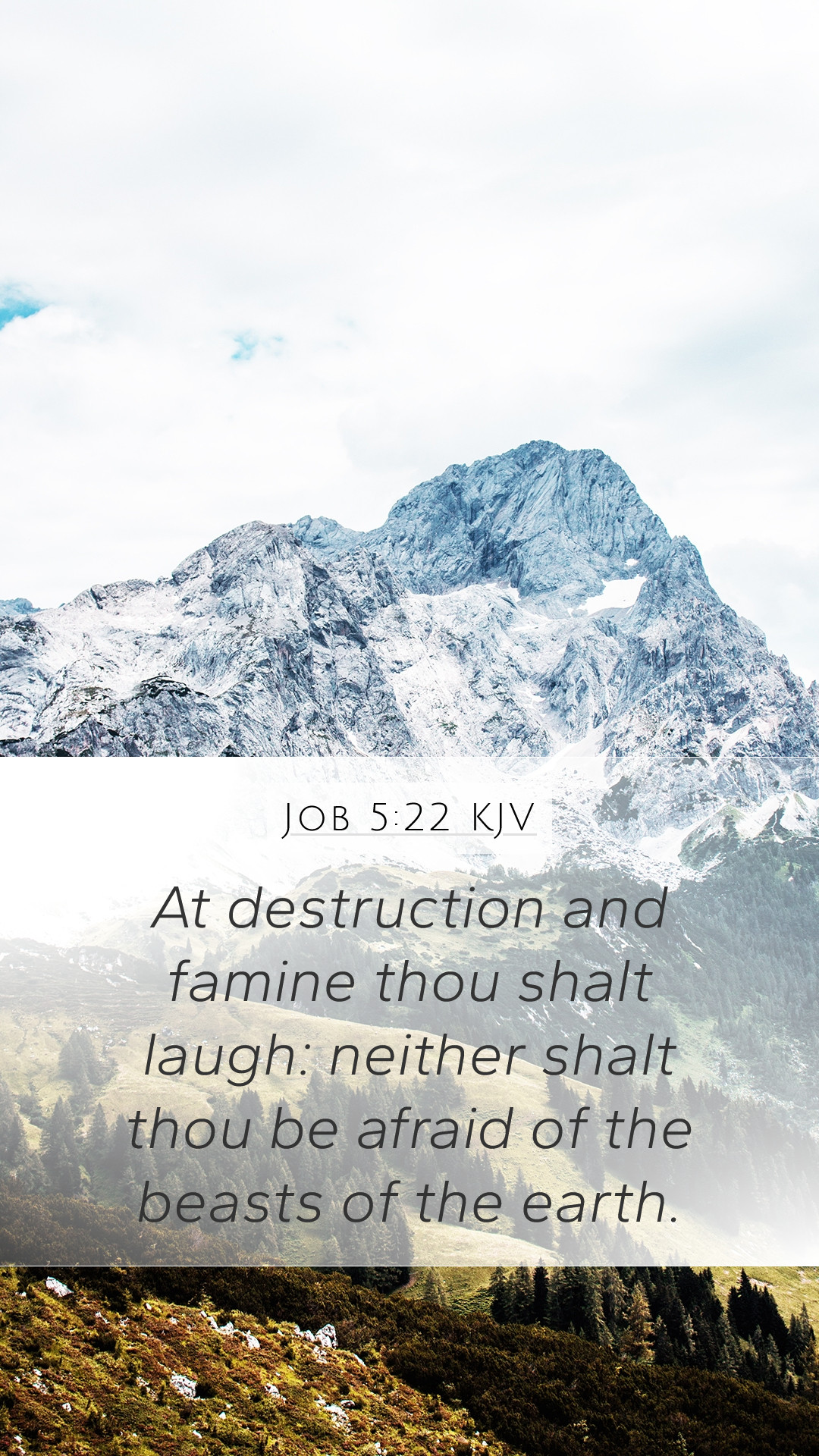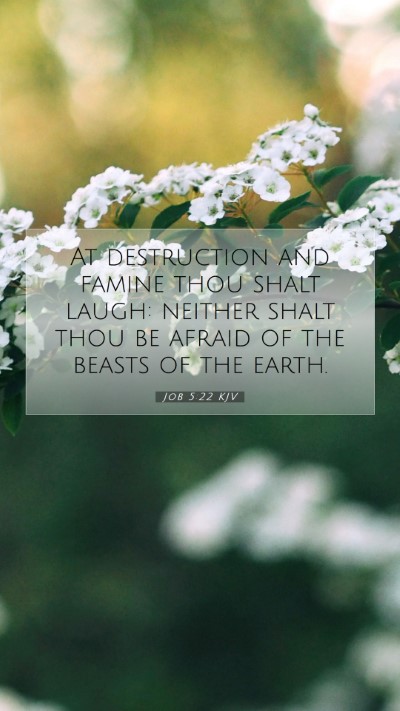Old Testament
Genesis Exodus Leviticus Numbers Deuteronomy Joshua Judges Ruth 1 Samuel 2 Samuel 1 Kings 2 Kings 1 Chronicles 2 Chronicles Ezra Nehemiah Esther Job Psalms Proverbs Ecclesiastes Song of Solomon Isaiah Jeremiah Lamentations Ezekiel Daniel Hosea Joel Amos Obadiah Jonah Micah Nahum Habakkuk Zephaniah Haggai Zechariah MalachiJob 5:22 Meaning
What is the meaning of Job 5:22?
At destruction and famine thou shalt laugh: neither shalt thou be afraid of the beasts of the earth.
Job 5:22 Bible Verse Meaning
Bible Verse Commentary: Job 5:22
Verse: "At destruction and famine thou shalt laugh: neither shalt thou be afraid of the beasts of the earth." (Job 5:22)
Meaning and Interpretation
This verse, part of Eliphaz's speech in the book of Job, conveys a profound message about the peace and security that come from trusting in God amid adversity. Through insights drawn from public domain commentaries, we gain a deeper understanding of its significance in both the historical and spiritual context.
Key Insights from Commentaries
-
Matthew Henry:
Henry emphasizes the confidence and joy that true believers possess, even in the face of calamity—specifically, destruction and famine. Believers know that God is in control and that they will ultimately be delivered from these trials. This perspective allows them to respond with laughter, symbolizing a deeper trust in God’s providence.
-
Albert Barnes:
Barnes highlights the contrasting emotions of fear and laughter that the faithful experience. While the ungodly may tremble at signs of destruction—like famine or danger from wild beasts—believers find solace and security through their relationship with God. Here, laughter signifies the dismissal of unjust fears, rooted in a firm faith.
-
Adam Clarke:
Clarke interprets this verse as an illustration of the believer’s fortitude. He notes that the faithful will not only endure but will thrive in difficult situations. This resilience stems from their unwavering trust in God, who controls all circumstances and can shield them from even the most perilous threats.
Context and Application
The broader narrative of the book of Job reveals a just man, Job, who suffers immense loss and hardship. The divine conversations underline the theme of faith under pressure. Job’s friends, including Eliphaz, often provide misguided comfort by suggesting that suffering is a direct result of sin. In contrast, this verse articulates an understanding that, through God’s grace, moments of despair can lead to profound peace and joy.
Application of Job 5:22 in Daily Life
In modern times, this passage serves as a comforting reminder for believers facing trials. It encourages the faithful to:
- Maintain a strong faith in God’s protection during hard times.
- Find joy regardless of circumstances.
- Trust in God’s overarching plan, even when immediate situations seem dire.
- Exhibit resilience and courage, reflecting the peace that comes from faith in God.
Cross References
This verse resonates with several other scriptural passages that expand on these themes of trust and resilience:
- Psalms 91:5-6: "Thou shalt not be afraid for the terror by night; nor for the arrow that flieth by day;"
- Isaiah 41:10: "Fear thou not; for I am with thee: be not dismayed; for I am thy God…”
- Philippians 4:6-7: “Be careful for nothing; but in every thing by prayer and supplication with thanksgiving let your requests be made known unto God.”
Conclusion
In examining Job 5:22, we uncover rich layers of meaning that encourage believers to trust in God's power and presence, regardless of life’s adversities. The insights provided through these commentaries foster a greater understanding of Scripture, enabling individuals and Bible study groups alike to explore their faith deeply.
By applying the meaning of this verse and reflecting on its significance in our lives, we engage in a fruitful journey of biblical exegesis, enhancing our Bible study resources and lessons.


